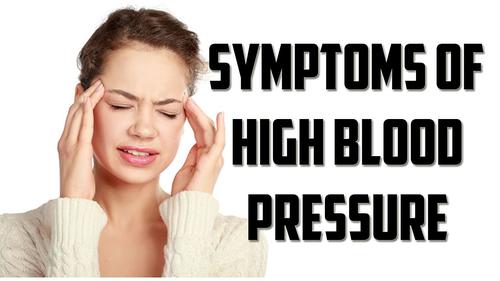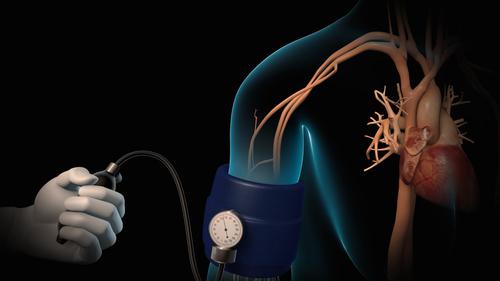Top Symptoms and Tips for High Blood Pressure
High blood pressure, also known as hypertension, is a condition that arises when human blood pressure rises above 140 over 90 levels. It is a condition that happens when blood flow is affected by some kind of resistance due to the narrowing of arteries. Measuring the amount of blood flow and resistance gives blood pressure readings. The causes of hypertension still remain unclear to date but there are conditions which are often identified as possibly responsible. There are two hypertension types:
- Primary hypertension develops over time with no clear cause. It is attributed to gene mutation or inherited abnormalities, physical changes like the failure of vital organs, e.g., kidneys, and lifestyle conditions like being overweight.
- Secondary Hypertension occurs more quickly and is the deadliest. It is believed to be caused by alcohol abuse and other illegal drugs, medicinal side effects, some endocrine tumors, lack of enough sleep, and kidney diseases.
Symptoms and Signs of High Blood Pressure
When symptoms of high blood pressure in women and men are experienced, immediate medical attention is needed. Regular checkups are the best way to keep you posted if there is need to worry regarding individual hypertension levels.

1. Common signs for both women and men
-
Headache: This is a condition where the head, neck, and scalp pain cause total discomfort. Increase in blood pressure can cause a severe headache.
-
Dizziness: Dizziness is not a disease type but is a symptom of an underlying problem, hypertension being one of them. It is a feeling where one gets, woozy, lightheaded, and unbalanced due to disruption in sensory organs like ears and eyes.
-
Nosebleeds: When the blood pressure rises, it can cause a bleeding nose. This is because the back and the front part of the nose contains very fragile blood vessels which might tear due to the pressure.
-
Blurred or double vision: Vision blurriness is where one fails to see images clearly, and double vision is where one sees double images while there is actually only one image. High blood pressure which causes headaches can affect your eyes.
-
Nausea and vomiting: When your brain strains due to blood pressure, nausea that sends some refractive signals to the vomiting center may result.
2. Symptoms of hypertension in newborns and young babies
Symptoms of high blood pressure in young ones are hard to recognize. Parents need to be very watchful.
-
Failure to thrive: Hypertension in children below ten years of age is often connected to some underlying health problems like heart problems. When hypertension is registered in a child, their growth is greatly slowed.
-
Seizure: In children, a seizure is characterized by body stiffening, jerky movement of legs and arms, staring, breathing problems, and loss of bowel or bladder control. Hypertensive encephalopathy is mostly manifested through seizures.
-
Irritability: Irritability can be explained as a feeling of agitation. Due to the sickness and tiredness that children with hypertension experience, most get easily upset and frustrated and this leads to irritation.
-
Lethargy: Lethargy (lack of energy) is associated not only with high blood pressure but also a number of unhealthy conditions. Because hypertension is a secondary condition, it contributes to the elevation of lethargy, which brings about dizziness and fatigue.
-
Respiratory distress: As a result of the high blood pressure on the delicate blood vessels in the lungs, they tend to strain a lot thus leading to a low oxygen supply. The oxygenated blood that is received by the heart to be supplied to other body organs is not always enough. Mostly, this happens to newborns who are suffering from pulmonary hypertension.

Tips to Treat High Blood Pressure
Hypertension can cause heart attacks, kidney failure or diseases, brain damage and stroke. Maintaining one's health and engaging in a good lifestyle can reduce high blood pressure symptoms. Below are the main tips.
1. Dietary changes
-
Limit salt intake: Excessive intake of sodium can elevate chances of hypertension because removal of excess water by the kidney is affected. It is vital to maintaining a sodium intake of under 1500 milligrams for teens and not exceeding 2300 milligrams (one teaspoon) for adults.
-
Alcohol and caffeine: Caffeine is a mild stimulant that is taken to increase people's alertness. Its effect results in high blood pressure as it is believed to have a hormone that hinders widening of arteries. Alcohol, on the other hand, alters the mental status. Low alcohol intake causes low hypertension but excess intake results in elevated hypertension. People suffering from hypertension are advised to reduce alcohol and caffeine intake.
-
The DASH diets: A dash diet can help prevent and treat hypertension. This includes taking of more veggies, fruits, dairy products with low fat, and overall less saturated fats. If one has to take animal meat, all the fat should be trimmed.
2. Engage in a lifestyle change
-
Exercise: Engaging in body exercise, probably 30 - 60 minutes for a period of five days continuously per week can improve blood flow. Physical activity improves cardio health needed to maintain healthy blood pressure levels.
-
Weight loss: Healthy body exercise and engaging in a diet that will maintain a good body weight greatly impact one's hypertension health. If a person is overweight or obese, their cholesterol level will be high which greatly contributes to high blood pressure. An ideal weight is perfect for hypertension managing.
In conclusion, hypertension is a deadly disease but highly attached to an individual's lifestyle, meaning its prevention and treatment depends on the individual's decisions. By following the above guidelines but with strict doctor's guidance and advice, one can prevent and treat hypertension. All that is needed is to engage a doctor and together decide on the best tips to use.
YOU MAY LIKE
-
How to Stop Heart Palpitation
-
Best Remedies to Reduce Cholesterol Naturally
-
Easily Available Foods That Reduce High Blood Pressure
-
How Much Cholesterol Per Day - Best Tips for You
-
Can Blood Pressure Indicate a Heart Attack?
-
How Much Blood Does an Average Human Body Have?
-
If Your ESR Level Is Very High Then What Will Happen - Best Tips for You
-
3 Kinds of Foods to Avoid With Diabetes
-
High Blood Sugar Can Make You Feel Bad and This Is Why?
-
Ways to Battle the Effects of High Blood Pressure
